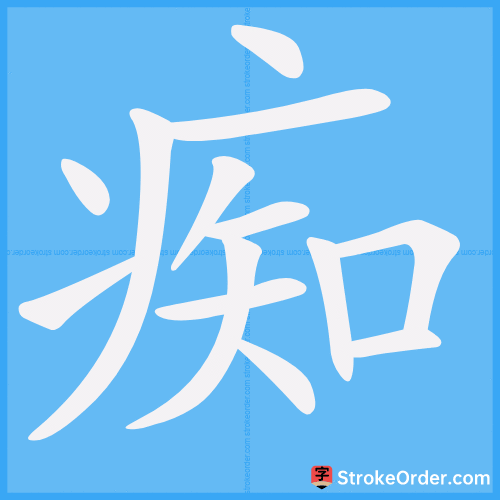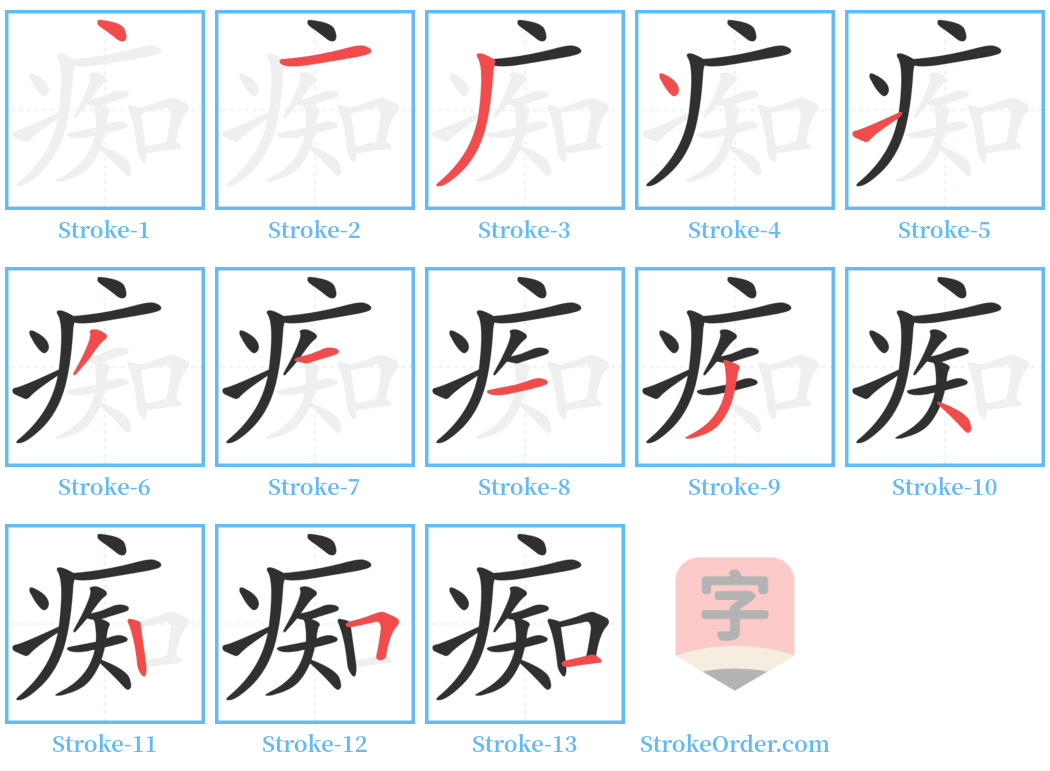痴 Stroke Order
Animated Stroke Order of 痴

Stroke Order Diagrams for 痴

Step-by-Step Handwriting Guide for 痴

Learn to Write Chinese Characters with Video Tutorials
Watch the video of writing the Chinese character "痴", learn the correct stroke order (笔顺) of the character "痴", and master the standard way of writing the character "痴".
Free Printable Handwriting Practice with Stroke Order: 痴
Printable Writing Practice Worksheet of "痴" in Portrait Orientation (Tian Zi Ge)

Printable Writing Practice Worksheet of "痴" in Landscape Orientation (Tian Zi Ge)

Information of 痴
Pinyin
chī
Radical
疒
Strokes
13 strokes
Usage
★★★★★
Definition
imbecile / sentimental / stupid / foolish / silly, imbecile / sentimental
痴
chī
1. Silly; ignorant.
傻,无知。
Example: 痴人说梦 (A silly person talks about dreams).
Example: 痴愚 (silly and foolish).
Example: 白痴 (idiot).
2. Mentally deranged; mad.
精神失常,疯癫。
Example: 发痴 (become dazed).
Example: 痴癫 (madness).
3. Infatuated; extremely obsessed.
入迷,极度迷恋。
Example: 痴心 (infatuated heart).
Example: 痴情 (deep affection).
4. A term of modesty; meaning in vain.
谦辞,白白地。
Example: 痴长 (saying oneself is several years older than the other for modesty).
5. The original meaning; not wise; dull.
【本义】: 不聪慧;迟钝
Example from literature: 癡,不慧也。字俗作痴。
6. Lasting.
持久不止。
Example: 痴雨 (long-lasting rain).
7. A naive term (as in naive child).
天真的昵称。
Example: 痴孩子 (naive child).
8. Buddhist terminology. One of the "three poisons" of greed, anger, and ignorance. Also known as moha in Sanskrit, it refers to ignorance and lack of understanding of reality.
佛教语。贪、瞋、痴“三毒”之一。
Example: 痴定 (meditating without wisdom).
动 (verb)
1. Stupefy; be dazed.
发呆。
Example from literature: 那边哭的自己伤心,却不道这边听的早已痴倒了。(While crying over there, they didn't realize that the listener over here had already become dazed.)
2. Be crazy about.
入迷。
Example: 痴魂 (infatuated spirit); 痴儿女 (lovers deeply in love).
名 (noun)
1. A general term for manic-depressive psychosis.
颠狂病。
Historical reference: 今子独坏形貌,蒙耻辱,为狂痴,光曜晻而不宣。(Now you alone have harmed your appearance, covering yourself with shame, becoming crazy and deranged.)
(*Note: This is derived from traditional dictionary explanations.)
*There is also a variant pronunciation.
to be carried away by one's wishful thinking (idiom) / to labor under a delusion / wishful thinking
lit. as if drunk and stupefied (idiom) / intoxicated by sth / obsessed with / mad about sth / also written 如癡如醉|如痴如醉[ru2 chi1 ru2 zui4]
lit. as if drunk and stupefied (idiom) / fig. intoxicated by sth / obsessed with / mad about sth
struggle and gesticulate savagely / act like a spoiled child / pout and try all one's sweet wiles
Input Method for 痴
Pinyin
chi1
Wubi
utdk
Cangjie
kokr
Zhengma
tmj
Four Corner
00160
Unicode
U+75f4
Same Pronunciation Characters